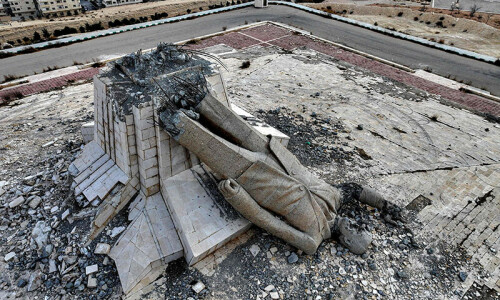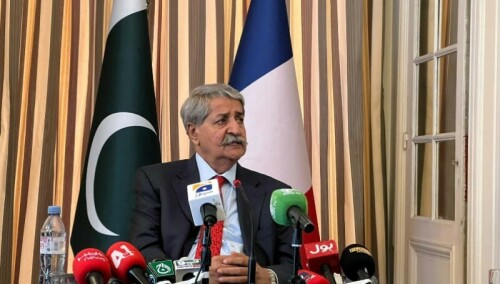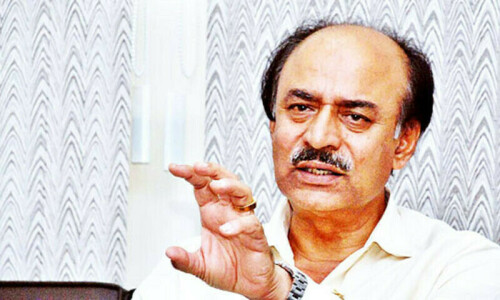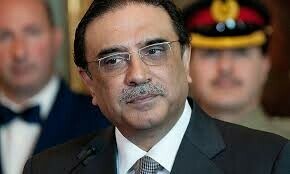LONDON: I call it the back of the book, the ream of reports and stories that pile up in my reporters’ notes which cannot be used; because the sourcing isn’t quite good enough for every detail or because there simply isn’t enough information to make it long enough to get into the paper.
It’s an enraging situation since the “back of the book” often turns out to be true – usually bursting into the papers when I’m on holiday or flying back to Beirut from Los Angeles, or, most awful of all, when I’m marching into The Independent office in London for a rare visit.
This is one reason why journalists are often more interesting to talk to than to read. The other reason is that American reporters are so fearful of being criticised by Israel that their work is bland to the point of incomprehension; if you want to know what The New York Times or The Washington Post knows, you’ve got to talk to one of their correspondents.
But I’m tired of these conventions. When I hear something in Dubai, then I hear it again in Qatar and then, a week later, over lunch in Beirut – and then on the phone from a friend who’s just returned from a holiday in Casablanca – you, the reader, should hear the same.
So here goes. The Middle East is currently boiling with rumours about the state of the monarchy in Morocco. Where is King Mohammed VI? In Qatar, they say he has spent two months’ holidays in the Far East (Thailand is the favourite) and this would account for his absence at President Sarkozy’s Bastille Day bash last month.
The king, it is said in Dubai, simply doesn’t want to be king any more – I always thought kings liked being kings, but no matter – and that he wants his brother to take the throne. And I suppose we shall never prove that £4bn have left a Moroccan account for Europe…
Let’s go to the Gulf for a while. Dubai is, as we all know, busy producing the largest, tallest, smallest, deepest buildings in the world. The highest one, however, appears to be a favourite haunt of the Russian mafia and, earlier this year – so Dubai’s Indian expatriate community insists – two rival gangs from Moscow fought it out with pistols and Kalashnikovs amid the towering architectural masterpieces.
The police had to storm this most famous of all the Gulf’s pearls in order to end the battle. Or that’s what they say.
Oh yes, and then there’s the little matter of the new railway line from Dubai city centre, aimed to terminate – for now, at least – at the emirate’s new international airport.
There’s a problem, however. Engineers in Dubai have apparently noticed that the carriages on the largely overhead track will be so narrow that passengers will not be able to carry baggage on them.
To Beirut now, and the almost totally unreported – and totally unexpected – arrival in the city of General David Petraeus, the US commander who has turned anarchic Iraq into a tourist paradise with just one surge and a lot of walls (or “fences”, as we would have to call them if they were built in Israel).
Petraeus saw Lebanon’s new president, Michel Sleiman, and the acting commander of Lebanon’s army, General Shawki el-Masri, with whom he discussed how to “strengthen the army’s defensive capabilities, training and logistics”.
Petraeus, the most popular general in American journalism, is to take charge of US central command, which will give him overall command of the Middle East, but you might have thought Lebanon was some way down his list of priorities.
Not so. For when you remember that the Lebanese army fought one of
Al Qaeda’s satellite groups, Fatah al-Islam, for months last year – last week’s bomb in Tripoli that killed nine Lebanese soldiers might have been the group’s revenge – Petraeus has good reason to turn up in Beirut.
Many of the suicide bombers who have assaulted Petraeus’s men in Iraq started their journey from the Palestinian refugee camps of Lebanon whose perimeters are guarded by Lebanese troops. Since 2006, the US has given about £170m in military assistance to Lebanon – Israel, of course, gets £1.5bn year – which includes Humvees, ammunition and lots of new blue police cars.
And there’s just one more thing. Less than a week after Petraeus’s visit, Sleiman was to pay his first presidential visit to Damascus. Did the American general perhaps have a few requests to make of President Bashar al-Assad via Sleiman? A word of thanks, perhaps, for improving security along Syria’s border with Iraq? A plea for a little more help in restraining the insurgents, perhaps even paving the way for good relations with the next US president? It will, obviously, take a bit longer before President Petraeus arrives in the White House…
Yet still the Middle East debates whether Israel or the US will bomb Iran. Personally, I don’t believe this will happen – but then again, that’s what I told my friend Seymour Hersh before the Iraqi catastrophe, when he said “we would invade” and I said “we wouldn’t”.
Currently, he thinks an Iran attack is still on the cards. So, apparently, does the Amir of Qatar. He’s generously handed the Americans yet more desert for their massive air base outside Doha, land that stretches away on the further side of the military installation. He’s asked for the return of the side of the base closest to the capital. The reason? Well, if America bombs Iran, the Islamic republic’s missiles are likely to come hissing towards US forces in Qatar. The amir wants them exploding as far from Doha as possible.
And we’ll have to finish in America. I received a letter last week from an old friend whose son has just returned from military duties in Iraq. And he’s been wandering the Pisgah mountains in the US with a group of school kids in an area where he noticed a lot of military training going on a year ago, and…
Well, I’ll let him tell you the story. “I had seen nothing more up there until this past week, when C-130s and C-17s suddenly were making low runs through the high mountain valleys. There were also military helicopters around. It may mean nothing, but it may indicate something for the future. I am enclosing some photos of the area to give you an idea of what it is like. Perhaps it reminds you of somewhere.”
And I looked carefully through my friend’s snapshots of rocky mountainsides and thick forests. And, darn me if they didn’t remind me of the Elborz mountain chain just outside Tehran.—Dawn/The Independent News Service















































Dear visitor, the comments section is undergoing an overhaul and will return soon.